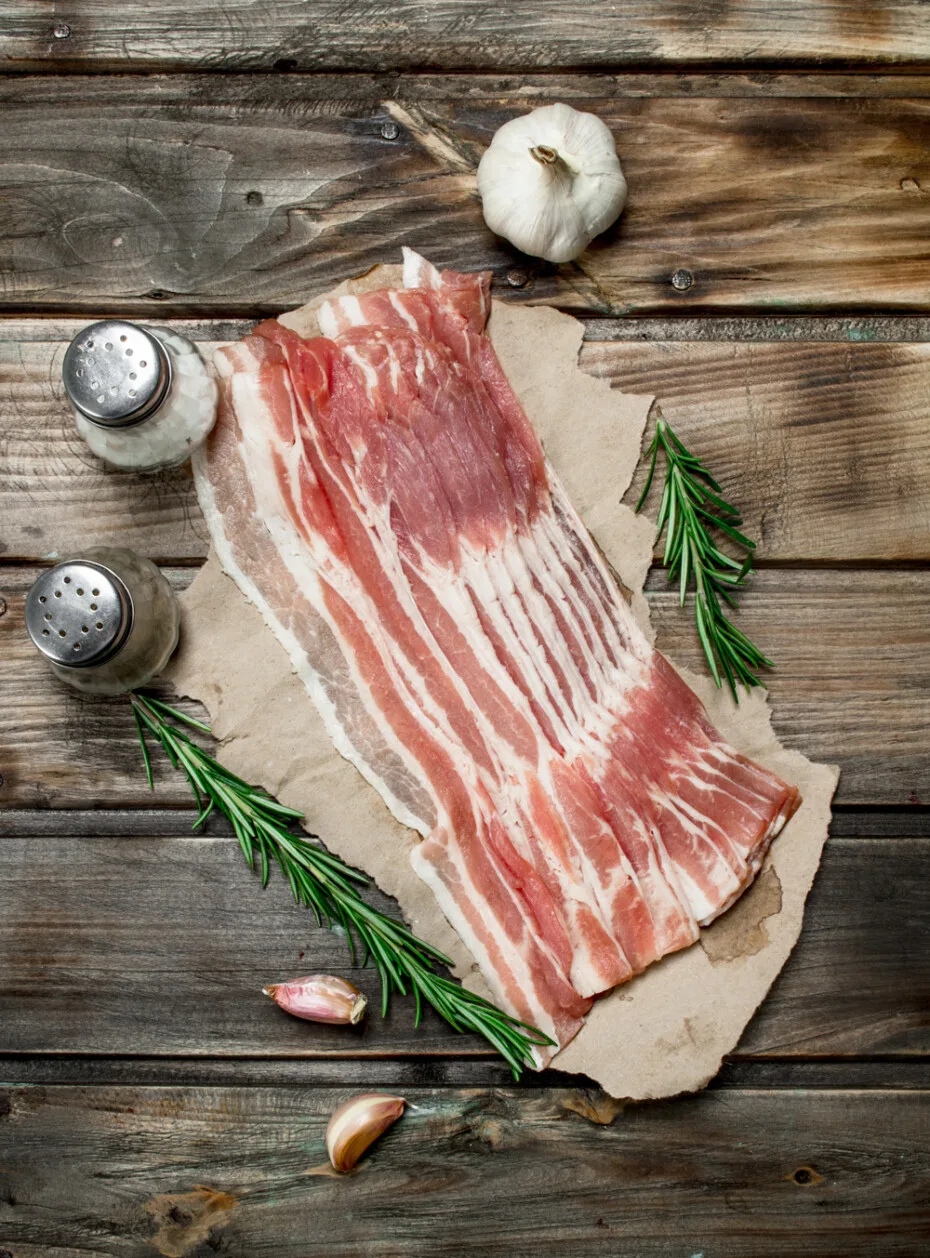Bacon is a delicious, crispy food that can be eaten for breakfast, lunch, or dinner.
You can eat it as is or use it as a topping on BBQ burgers, pasta, baked potatoes, and so much more.
Whether your bought storebought bacon or cured your own bacon at home, knowing how to tell if bacon is bad is essential, especially if you want to avoid developing food poisoning.
Contents
How To Buy Bacon
Sure, you could easily pick up a slab f bacon and place it into your cart. However, purchasing bacon involves more than that.
First, look for bacon with a few ingredients. If you can find a food product with 1-2 ingredients in today’s modern world is like finding a needle in a haystack.
Although it may cost a lot more, would you rather purchase bacon that was manufactured with a few ingredients you can recognize and pronounce or bacon with a long list of ingredients you cannot pronounce?
Purchase bacon with four or fewer ingredients. Pork, water, salt, and brown sugar would be the ideal ingredients for bacon.
In addition to this, do not be fooled by a no nitrates added label. This does not mean the bacon is free of nitrates.
It simply means the bacon was cured with celery instead of sodium nitrate.
Celery contains lots of nitrates, as most vegetables do. So the bacon is not nitrate-free.
Ultimately, the ideal bacon should be manufactured locally, with little preservatives from animals who were raised humanely.
Lastly, shop for all your other grocery items before you pick up your bacon.
Bacon should always be the last item you pick up before heading to the checkout. The bacon could warm up under all of your other grocery items.
If you have a cold storage bag for your meat items, place your bacon into this bag to keep it cold while you are traveling home.
Once you are at home, store the bacon immediately.
How To Store Bacon
Whether you are defrosting bacon or simply refrigerating bacon you just bought from the store, it is essential you know how to store bacon the right way. Storing the bacon properly can maximize its lifespan and quality.
You can place the unopened bacon into your freezer as is.
However, you may want to wrap the bacon with aluminum foil to prevent freezer burn.
To keep it fresh, open uncooked bacon should be wrapped with aluminum foil or in an airtight container before placing it into the freezer or fridge.
Cooked bacon should be divided into smaller portions and covered with paper towels before freezing them.
If you are storing an unsliced slab of bacon, wrap it with aluminum foil or place it into an airtight container.
The slab of bacon will last in the refrigerator for a few weeks. Do not freeze slabs of bacon as it will spoil quickly.
What Happens if You Eat Spoiled Bacon
Eating spoiled bacon is like playing Russian roulette with your life. Your risk of developing food poisoning will skyrocket.
Although you may not physically see the bacteria, the bacon could be loaded with bacteria.
Bacteria leads to foodborne illness, and you may experience symptoms such as abdominal pain, vomiting, fatigue, diarrhea, and fever.
How Long Does Bacon Last in the Refridgerator?
The shelf life of bacon depends on whether it is cooked or fresh. Raw bacon will last in the fridge for 1 week.
Cooking the bacon will add an additional week to its shelf life.
How To Tell if Bacon Is Bad
Bacon is known for its delicious aroma and flavor. However, bacon is fragile.
It contains high concentrations of fat and water, which means it is at greater risk of being tainted with bacteria. Therefore you must know how to tell if bacon is bad.
Expiration Date
Like shrimp, chicken, and pork, bacon has an expiration date.
The bacon’s expiration date may also be labeled as use-by or best-by date. If either of these dates has passed, do not use the bacon.
Do not confuse the sell-by date with the use-by date. The sell-by date does not mean the bacon is not safe to eat.
The sell-by date lets the retailer know how long they can sell the bacon.
The sell-by date is a reminder that you need to eat the bacon sooner instead of later.
You can use the bacon within 7 days after the use by or sell-by date.
If you froze your bacon, you can defrost it and cook it within 4 months of freezing it.
Inspect the Bacon
The eyes are the perfect way to inspect whether bacon is good or not. However, you will need a good light source for this method.
Good bacon has a bright pink color white fat that may sometimes be yellow.
Bacon is spoiled if it has green dots or has a dull gray-brown color.
Aroma
The smell test can prevent you from consuming spoiled bacon. Yes, all meat has an odor.
However, if your bacon has an unpleasant, rancid, robust smell, it has gone bad.
Touch
Bacon is naturally soft and contains a bit of moisture. But if your bacon feels slimy, it is a sign that lactic acid bacteria are on the surface of the bacon, which means it is spoiled.
Wash your hands really well after touching the bacon.
How To Tell if Cooked Bacon Is Bad
Cooked bacon can develop mold if it is left inside the refrigerator for too long.
However, if there the bacon has small furred blue or white spots on it, the bacon has mold and is unsafe to eat.
How To Discard Bacon
Once your bacon is spoiled, it must be discarded. Do not toss the bacon into the trash as is, or it could not only stink up your trash bin if it isn’t full, but it could stink up the whole kitchen.
Wrap your bacon in a plastic bag or resealable zip-lock bag and place it into an outdoor garbage bin.
Although you may not want to waste the bacon, do not give it to your pets. It still contains bacteria and may not be safe for your pets.
Wash your hands really well after handling spoiled bacon.
Final Thoughts
Bacon is a delicious treat perfect for breakfast, lunch, or dinner. However, it is not safe to consume soiled bacon.
Luckily, this won’t be an issue since you know how to tell if bacon is bad.
You might also be interested in:
- How To Tell If Chicken Is Bad
- How To Tell If Steak Is Bad
- How To Tell If Beef Is Bad
- How To Tell If a Hamburger Is Bad
- How To Tell If Pork Is Bad
- How To Tell If Pork Chops Are Bad

I have been smoking and grilling meat from an early age and enjoy sharing my knowledge and expertise through the hundreds of articles I have written about BBQ. I hope to make everyone’s BBQ journey that little bit easier.

